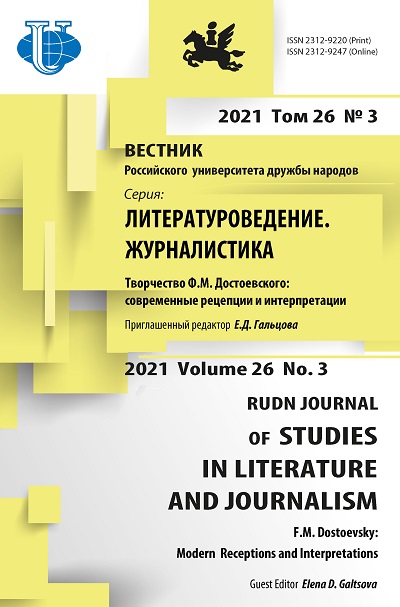Причины «невстречи»Ф.М. Достоевского и Льва Толстого
- Авторы: Басинский П.В.1
-
Учреждения:
- Литературный институт имени А.М. Горького
- Выпуск: Том 26, № 3 (2021): ТВОРЧЕСТВО Ф.М. ДОСТОЕВСКОГО: СОВРЕМЕННЫЕ РЕЦЕПЦИИ И ИНТЕРПРЕТАЦИИ
- Страницы: 392-397
- Раздел: Литературоведение
- URL: https://journals.rudn.ru/literary-criticism/article/view/27641
- DOI: https://doi.org/10.22363/2312-9220-2021-26-3-392-397
- ID: 27641
Цитировать
Полный текст
Аннотация
Вновь рассматривается известный историко-литературный парадокс: современники Ф.М. Достоевский и Л.Н. Толстой лично не были знакомы, хотя не раз имели возможность для этого. Обосновывается предположение, что главной причиной такой «невстречи» было не только стечение случайных обстоятельств, но и невероятная интуиция обоих писателей: постоянно читая друг друга, чувствуя глубочайшую духовную близость и понимая обоюдное значение для литературы и общества, оба избегали бытовых встреч даже по литературным поводам, так как опасались, что возможная словесная дискуссия приведет к невольной, пусть даже временной профанации их воззрений.
Об авторах
Павел Валерьевич Басинский
Литературный институт имени А.М. Горького
Автор, ответственный за переписку.
Email: basinski2006@yandex.ru
кандидат филологических наук, доцент кафедры литературного мастерства, руководитель семинара прозы
Российская Федерация, 123104, Москва, Тверской б-р, д. 25Список литературы
- История одной вражды. Переписка Достоевского и Тургенева / под ред., с введ. и прим. И.С. Зильберштейна; предисл. Н.Ф. Бельчикова. Л.: Academia, 1928. VIII. 200 с.
- Шкловский Виктор. Ссора Тургенева с Толстым // Шкловский Виктор. Лев Толстой. М.: Молодая гвардия. 1963. С. 110-119.
- Толстой Л.Н. Собр. cоч.: в 22 т. М.: Худ. лит., 1984. Т. XVII-XVIII. 912 c.
- Достоевская А.Г. Воспоминания. М.: Правда, 1987. 544 с.
- Суслов И.М. Памятник Пушкину. М.: Московский рабочий. 1983. 64 с.
- Речи о Пушкине / сост., подг. текстов и комм. В.С. Непомнящего и М.Д. Филина; послесл. В.С. Непомнящего. М.: Текст, 1990. 390 с.
- Левитт М.Ч. Литература и политика: Пушкинский праздник 1880 года. СПб.: Академический проект, 1994. 265 с.
- Дмитренко С.Ф. Образ Пушкина в письмах Ф.М. Достоевского (К проблеме самоидентификации автора) // Пушкин и Достоевский. Международная научная конференция 21-24 мая 1998 года: материалы для обсуждения. Новгород Великий-Старая Русса, 1998. С. 71-75.
- Достоевский Ф.М. Полн. собр. соч.: в 30 т. Т. 30. Кн. 1. Л.: Наука, 1988. 456 с.
- Толстой Л.Н. и Толстая А.А. Переписка (1857-1903): М.: Наука, 2011. 1001 с.
- Переписка Л.Н. Толстого с графиней А.А. Толстой. 1857-1903 гг. СПб., 1911.
- Переписка Л.Н. Толстого с Н.Н. Страховым. 1870-1894. СПб.: Изд-е Общества Толстовского музея, 1914.
Дополнительные файлы















